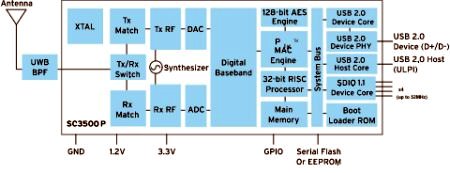WUSB chip gains Linux-based dev kit
Mar 17, 2008 — by Eric Brown — from the LinuxDevices Archive — 2 viewsFabless semiconductor vendor Staccato Communications has shipped a development kit aimed at helping product designers add its WUSB (wireless USB) chips to mobile handsets, digital cameras, printers, portable media players, mass storage, and wireless audio/video devices. The Ripcord1 Development Kit includes an XScale PXA270-based SBC (single-board computer) running embedded Linux.
The Ripcord1 kit aims to help designers integrate Staccato's Ripcord WUSB IC (integrated circuit), a “single-chip, all-CMOS” part also known as the SC3500. The chip is said to feature a small form factor and low power usage, and to have passed “all” USB Implementers Forum (USB-IF) certification tests for the 480Mbps WUSB standard, including WiMedia PHY and MAC certifications.

Ripcord SC3500P block diagram
To help designers evaluate the characteristics of the SC3500's MAC and PHY in the real world, the Ripcord kit includes a small SBC based on Linux and the XScale PXA270 mobile applications processor. Other kit components include a “fully abstracted” software library called the Ripcord Control Library (RCL), documentation, and example code. Available separately are a number of reference designs, including an SC3226R-C SDIO (secure digital I/O) card form factor design for embedded applications.
Stated Marty Colombatto, CEO for Staccato, “Instead of writing the function drivers from scratch, Staccato's Ripcord1 Development Kit offers them in a fully abstracted library. The [kit and library] have been recently certified as a WUSB native device solution, allowing a smooth path through certification.”
Availability
The Ripcord1 Development Kit is currently available to qualified customers, says Staccato, with pricing available upon request. Noting that WiMedia OFDM (orthogonal frequency division multiplexing) technology also underpins Ultra-Wideband (UWB) and Bluetooth 3.0, Staccato says it will eventually ship Ripcord-based products for all three protocols.
This article was originally published on LinuxDevices.com and has been donated to the open source community by QuinStreet Inc. Please visit LinuxToday.com for up-to-date news and articles about Linux and open source.